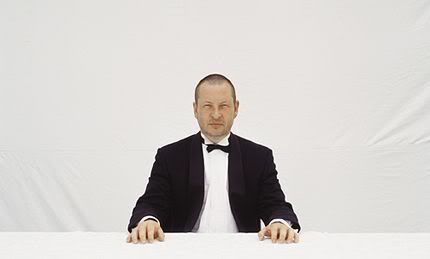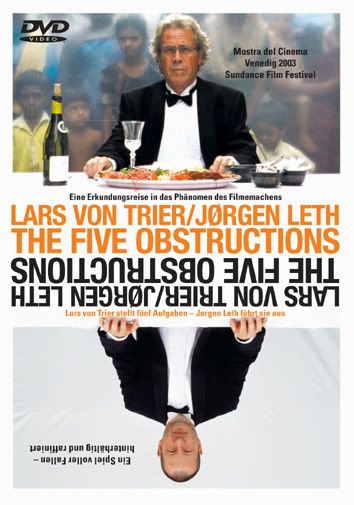On Lars von Trier and The Five Obstructions
 Lars von Trier is a man who, with every fiber of his being, wants me to hate him. He is constantly trying to make me hate him, with his pompous attitudes and often ridiculous filmmaking techniques (Dogme, Automavision). But everything he does just makes me like and respect him a great deal, especially those high-minded ideals and avant-garde ways to make movies. He is a study in contradictions: von Trier grew up with Jewish, communist, nudist parents, but converted to Catholicism late in life (yet his Zentropa films has distributed hardcore porn); he is notoriously afraid of flying, and almost never leaves Denmark, but is world-renowned for his films. Such a complicated man could only make the kinds of ilms that von Trier does, and is one of the directors where having some biographical information makes the films make so much more sense. I have loved almost every von Trier film I've seen, especially Manderlay. All these things, that self-righteous yet intensely searching attitude, that love of new, difficult filmmaking technology, come to a head in The Five Obstructions.  This film is a study in the process of filmmaking, and I am always a sucker for films about making films. von Trier challenges one of his mentors (and friend) Jorgen Leth to remake his 1967 short film The Perfect Human (which von Trier says he has seen 20 times) five times, each time incorporating several obstructions designed to make Leth a better director. The obstructions range from shot lengths, to animation, and the poles of complete creative freedom and none at all. This is the kind of movie where two men sit around and talk about the process of making movies, which, in turn, is really about life and the way one lives. This kind of thing has been described as mental masturbation, a kind of mental exercise for those bourgeois artists with nothing better to do. I disagree; this is the 21st century equivalent of philosophers of centuries past discussing the meaning of life. von Trier sees that his mentor, his friend Leth is slipping into obscurity, whether because of the changing public or because of Leth's own complacency, and devises these obstructions to get past the shallow Leth, into the depths of his self. Whether or not Leth learns anything from these obstructions is debatable; whether or not von Trier learns anything is also questionable. But these two friends debating about the bare nature of film and the director's place in it, is well worth the watch for those interested in the inside of movies. 8.5/10 Labels: lars von trier |

Comments on "On Lars von Trier and The Five Obstructions"
post a comment